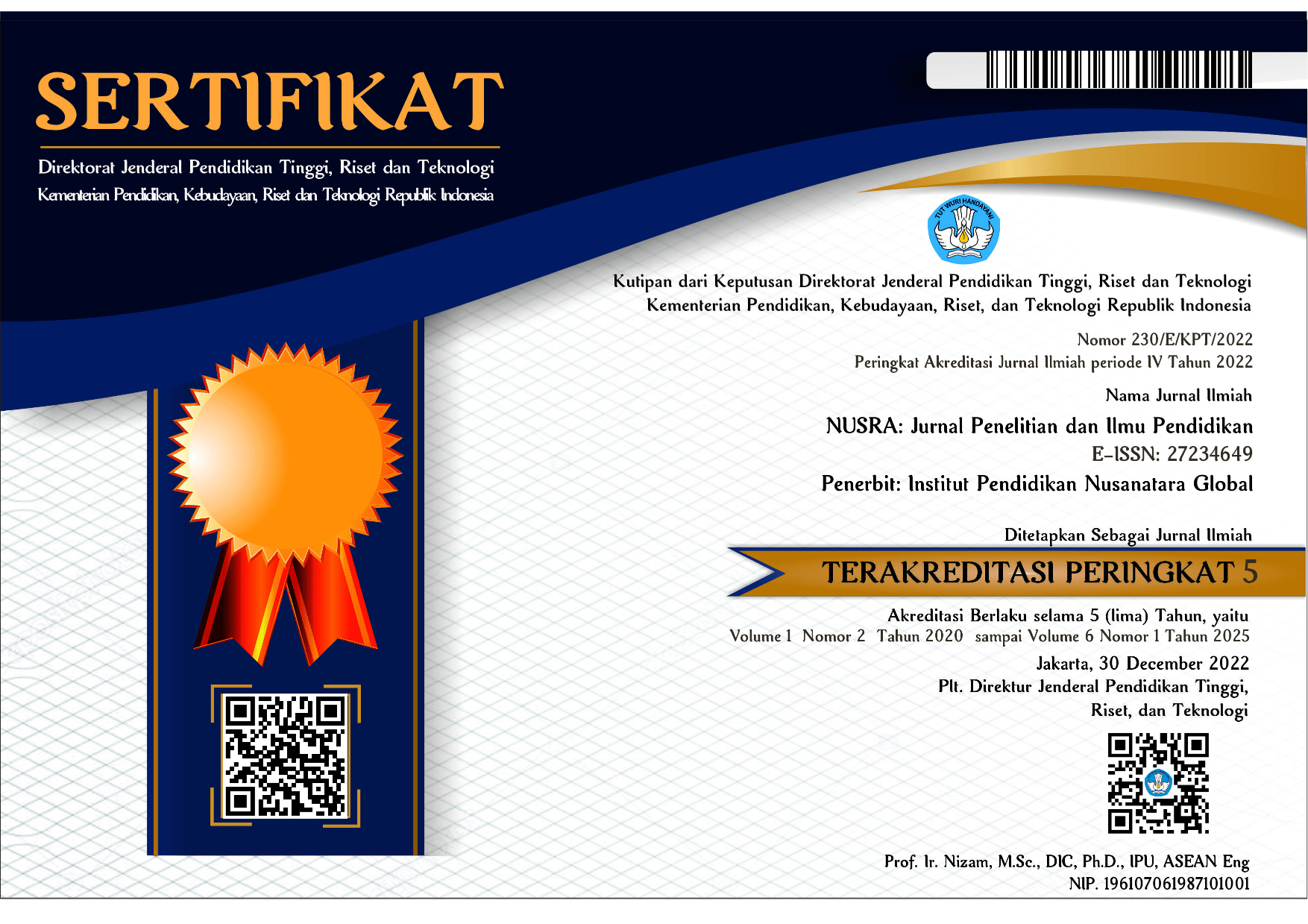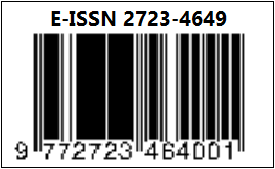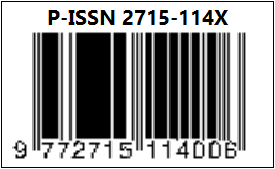HUBUNGAN WORKING MEMORY DAN LITERACY DENGAN KEMAMPUAN PRAGMATIK ANAK USIA PRASEKOLAH DI SURAKARTA
DOI:
https://doi.org/10.55681/nusra.v4i4.1737Keywords:
Working Memory, Literacy, Pragmatic AbilityAbstract
The ability to carry out good social interactions in children must be accompanied by good cognitive abilities as well. Cognitive is related to intelligence. Memory is complex and central to many cognitive operations. Working Memory (WM) is the ability to store information and process information at the same time. There is a strong relationship between Working Memory (WM) and Literacy abilities. Literacy is generally defined as the ability to read and write and use spoken language. Research Objective: To determine the relationship between working memory and literacy with the pragmatic abilities of preschool children in Surakarta. Subjects and Methods: This study used a correlational design. The sample size for this study was 173 children. Data collection uses questionnaires and test instruments. Research Results: Hypothetical testing using the Simultaneous Test can be explained that the variables working memory ability and literacy ability are jointly related to the pragmatic abilities of preschool aged children in Surakarta with a significance figure of 0.000. The resulting coefficient of determination (R2) is 0.079 or 7.9%. In the multiple linear regression test, the equation Y = 48,714 + 1,740 X1 is obtained.
Downloads
References
Arnianti. (2019). Teori perkembangan Bahasa. Perkembangan Kendiri, 1(1), 1–15.
ASHA. (2019). Language In Brief. The American Speech-Language-Hearing Association (ASHA).
Atkinson, R., & Shiffrin, R. (2000). Jenis-Jenis Ingatan (Memori).
Baddeley, A. (2010). Working memory. Current Biology, 20(4), 136–140.
Darwin, D., Anwar, M., & Munir, M. (2021). Paradigma Strukturalisme Bahasa: Fonologi, Morfologi, Sintaksis, dan Semantik. Jurnal Ilmiah SEMANTIKA, 2(02), 28–40.
LWTears. (2021). Why is Literacy Development Important for Children? Learning Without Tears.
Masfufah, U. (2021). Bahasa & Perkembangan Literasi pada Anak Usia Dini: Sebuah Studi Literatur. Alzam: Journal of Islamic Early Childhood Education, 1(01), 7–13.
Masitoh. (2019). Gangguan Bahasa dalam Perkembangan Bicara Anak. Jurnal Elsa, 17(1), 1–15.
Nasucha, Y. (2018). Budaya Literasi Terhadap Pemahaman Teks dalam Kegiatan Berbahasa. Ilmiah Bahasa Dan Sastra Indonesia (IBSI).
Plessis, S. du. (2018). Auditory Memory: Importance, Test, Overcoming Deficits.
Pradeep Kumar Gupta, & Dr. Vibha Sharma. (2017). Working Memory and Learning Disabilities: A Review. International Journal of Indian Psychology, 4(4).
Putranto, P. L. (2009). the Effect of Brain Gym To the Short Term Memory Function of Program Pascasarjana Magister Ilmu Biomedik Program Pendidikan Dokter Spesialis I.
Putri, A. R., Pamungkasari, E. P., & Prasetya, H. (2020). Factors Affecting Early Detection and Stimulation by Mothers and their Impact on Receptive Language Skills of Children Age 4 to 6 Years. Journal of Maternal and Child Health, 5(3), 235–242.
Raharjo, T. (2017). Meta-Analisis: Working Memory dan Literasi pada Anak Disleksia. Jurnal Psikologi Insight, 1(1), 1–13.
Raisingchildren. (2020). Developing Literacy. Raising Children the Australian Parenting Website.
Santrock, J. W. (2019). Life-Span Develoment (13th ed.). McGraw-Hill.
Shipley, K. G., & McAfee, J. G. (2021). Assessment Pathology in Speech-Language Pathology, A Resource Manual Sixth Edition (6th ed.). Plural Publishing.
Sumaryanti, L. (2017). Peran Lingkungan Terhadap Perkembangan Bahasa Anak. MUADDIB, 07(01), 1–18
Downloads
Published
How to Cite
Issue
Section
License
Copyright (c) 2023 NUSRA: Jurnal Penelitian dan Ilmu Pendidikan

This work is licensed under a Creative Commons Attribution-ShareAlike 4.0 International License.














